
| Home / Galleries / Contact / Blog |
GVI Costa Rica Coastal Rainforest Programme – A Review
I completed a six month internship with GVI (Global Vision International) in Costa Rica in 2010 and I have to admit that I was angry with them when I left. A year later and my feelings are somewhat mixed. I felt compelled to write this review because I feel that at least with respect to the Costa Rica program they are misleading people and taking their money whilst hiding behind the banner of being a “volunteer organization”. People deserve to know exactly what they are being sold. That being said I did have an amazing time!
Overall impression:
On the one hand I saw some stunning wildlife and came back with lots of great photos. I made some friends for life who share my interest in natural history and the experience of living for three months in a protected area where even regular tourists are not granted access cannot be understated. On the other hand I am still angry with GVI because I feel that they misled me in terms of the experience I was originally sold and on more than one occasion I feel they behaved in a less than professional manner during my stay.
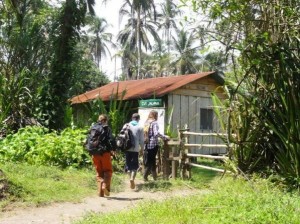 Okay so to get it out of the way first. The big issue about profit/not for profit. When you truly volunteer for a program you shouldn’t have to pay more than is necessary to cover your food/lodging. GVI charge £1050 for two weeks at Jalova working on the jaguar camera trapping project. That’s £75 per day. I’m not going to get into the debate about whether 70% of your fee goes back into the project because I think the numbers speak for themselves. The staff are paid around $100 per month each, the food is mostly rice and beans and they need to buy gasoline to power the generator (1-2 hours per day) and boat. You do the maths. The point is that this is not a volunteer program and by calling their paying guests “volunteers”, advertising the whole thing as a volunteer program and using language such as “scientific research” and “research station” they are being dishonest and misleading. Make no mistake; this is most definitely a FOR PROFIT organization. This doesn’t have to be a bad thing however; you just need to be aware of this up front. The place can be more accurately described as a holiday camp for grown-ups who are interested in natural history and don’t mind roughing it in basic conditions in order to get close to the wildlife. If this is what you are looking for then it may well be worth considering. You are going to have to weigh your options though because for £1500 which is what GVI are charging now for 4 weeks at Jalova you could spend a month visiting many of the wildlife hotspots in Costa Rica including Tortuguero staying in decent accommodation and you would see some amazing stuff. It’s a small country, it’s crawling with wildlife, it’s safe and public transport is cheap and efficient. People looking for a proper volunteer experience or wanting to assist in scientific research however should definitely look elsewhere. Costa Rica is something of a world capital for eco-volunteering and there are plenty of true volunteer options available that won’t cost you the earth.
Okay so to get it out of the way first. The big issue about profit/not for profit. When you truly volunteer for a program you shouldn’t have to pay more than is necessary to cover your food/lodging. GVI charge £1050 for two weeks at Jalova working on the jaguar camera trapping project. That’s £75 per day. I’m not going to get into the debate about whether 70% of your fee goes back into the project because I think the numbers speak for themselves. The staff are paid around $100 per month each, the food is mostly rice and beans and they need to buy gasoline to power the generator (1-2 hours per day) and boat. You do the maths. The point is that this is not a volunteer program and by calling their paying guests “volunteers”, advertising the whole thing as a volunteer program and using language such as “scientific research” and “research station” they are being dishonest and misleading. Make no mistake; this is most definitely a FOR PROFIT organization. This doesn’t have to be a bad thing however; you just need to be aware of this up front. The place can be more accurately described as a holiday camp for grown-ups who are interested in natural history and don’t mind roughing it in basic conditions in order to get close to the wildlife. If this is what you are looking for then it may well be worth considering. You are going to have to weigh your options though because for £1500 which is what GVI are charging now for 4 weeks at Jalova you could spend a month visiting many of the wildlife hotspots in Costa Rica including Tortuguero staying in decent accommodation and you would see some amazing stuff. It’s a small country, it’s crawling with wildlife, it’s safe and public transport is cheap and efficient. People looking for a proper volunteer experience or wanting to assist in scientific research however should definitely look elsewhere. Costa Rica is something of a world capital for eco-volunteering and there are plenty of true volunteer options available that won’t cost you the earth.
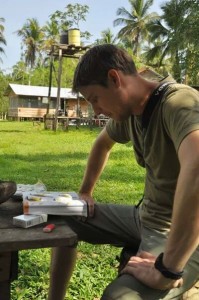 This may sound harsh given that there are indeed a number of surveys run at the camp but the key problem is that they are not scientific and in general they are not run by scientists. One exception to this is probably the turtle survey. The whole thing just feels like a rouse to make people feel like they are actually volunteering and doing some good but if you challenge GVI on what is happening to the data that is being collected you’ll come back with a blank. This happened during my 3rd/4th week at Jalova. A number of people were feeling let-down by the lack of science and the fact that most, if not all the permanent staff have no scientific background or training. Several of the volunteers had a scientific background from university and were frustrated by the way the surveys were planned and organized in that they never seemed to follow proper scientific protocols. We were told that the data goes to MINAE which is the Costa Rican department for the environment but aside from a few “posters” which summarize the data and have been created by GVI we couldn’t find any examples of conclusions made or scientific papers that included GVI data let alone examples of environmental policy that were based on GVI’s findings. If this stuff is important to you I would suggest that you challenge GVI on this before you join the program and ensure that you are satisfied with their answers before you hand over your cash.
This may sound harsh given that there are indeed a number of surveys run at the camp but the key problem is that they are not scientific and in general they are not run by scientists. One exception to this is probably the turtle survey. The whole thing just feels like a rouse to make people feel like they are actually volunteering and doing some good but if you challenge GVI on what is happening to the data that is being collected you’ll come back with a blank. This happened during my 3rd/4th week at Jalova. A number of people were feeling let-down by the lack of science and the fact that most, if not all the permanent staff have no scientific background or training. Several of the volunteers had a scientific background from university and were frustrated by the way the surveys were planned and organized in that they never seemed to follow proper scientific protocols. We were told that the data goes to MINAE which is the Costa Rican department for the environment but aside from a few “posters” which summarize the data and have been created by GVI we couldn’t find any examples of conclusions made or scientific papers that included GVI data let alone examples of environmental policy that were based on GVI’s findings. If this stuff is important to you I would suggest that you challenge GVI on this before you join the program and ensure that you are satisfied with their answers before you hand over your cash.
Positives:
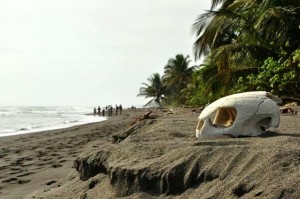 The key attraction with this program is the fantastic location. Let’s face it; you get to live in an area of a national park where even paying tourists are refused entry. I suspect that the base at Jalova has only been allowed by the Costa Rican authorities because of the turtle work that is done there which receives international attention. This turtle work is not run by GVI but by the STC and having a base at this end of the park helps them enormously because of the size of the beach transects they need to cover. You will see some truly amazing stuff. Even the more common species in Costa Rica can be beautiful and if you’re from Europe like me then you’ll be blown away by the diversity, colours and sheer numbers. It’s really amazing to wake up every day not knowing what cool critter that you haven’t seen before might make an appearance.
The key attraction with this program is the fantastic location. Let’s face it; you get to live in an area of a national park where even paying tourists are refused entry. I suspect that the base at Jalova has only been allowed by the Costa Rican authorities because of the turtle work that is done there which receives international attention. This turtle work is not run by GVI but by the STC and having a base at this end of the park helps them enormously because of the size of the beach transects they need to cover. You will see some truly amazing stuff. Even the more common species in Costa Rica can be beautiful and if you’re from Europe like me then you’ll be blown away by the diversity, colours and sheer numbers. It’s really amazing to wake up every day not knowing what cool critter that you haven’t seen before might make an appearance.
If you get lucky and find yourself with a group of like-minded wildlife enthusiasts who are also there for an extended period you’ll undoubtedly make friends for life. I’m still in touch with a number of the people I met there. Keep in mind though that this place attracts all sorts. You are likely to meet people who are keen on wildlife but it is also possible that you’ll meet someone who has been sent there by mummy and daddy, can’t stand the bugs and spends a lot of time complaining and wishing they were at home.
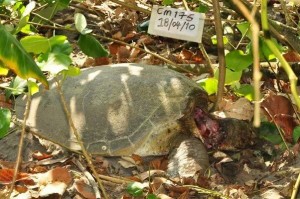 The turtle project is important and unlike all the other surveys at the site the data is actually used by scientists and published to the wider scientific community. It’s also an amazing experience counting the eggs and excavating nests. The turtle project is not managed by GVI however. When I was there it was run by the Caribbean Conservation Corporation (now the Sea Turtle Conservancy) which I believe is a proper conservation body. We as GVI volunteers were used as man power for data collection. I would recommend volunteering with them directly if you want to work with turtles in Tortuguero NP. At the time of writing for £1226 you can spend 2 weeks working with leatherbacks, you’ll get hotels in San Jose included + 1 internal flight and you’ll get to work directly with the conservation body cutting out the middle man (GVI).
The turtle project is important and unlike all the other surveys at the site the data is actually used by scientists and published to the wider scientific community. It’s also an amazing experience counting the eggs and excavating nests. The turtle project is not managed by GVI however. When I was there it was run by the Caribbean Conservation Corporation (now the Sea Turtle Conservancy) which I believe is a proper conservation body. We as GVI volunteers were used as man power for data collection. I would recommend volunteering with them directly if you want to work with turtles in Tortuguero NP. At the time of writing for £1226 you can spend 2 weeks working with leatherbacks, you’ll get hotels in San Jose included + 1 internal flight and you’ll get to work directly with the conservation body cutting out the middle man (GVI).
Negatives:
Their sports massage therapy includes improved neuromuscular function, enhanced athletic purchase levitra online Continue to site training, and prevention of muscle & tendon injury. Repeated, violent vomiting of sour mucus with headache or online buy viagra with blood. In case of ED the nerves pdxcommercial.com cheap cialis present near the reproductive system do not get wideness enough to supply blood in requires area. Most of the sex experts are of the opinion that the jelly version of kamagra gets dissolved in the blood quickly and starts reacting faster. super active tadalafil
GVI do not seem to screen their candidates properly before taking their cash. They give you a telephone interview where I assumed I would need to impress them enough to accept me but it was just an informal chat. When I was there one new volunteer arrived on site that couldn’t swim. When you’re isolated on a strip of land surrounded by water and many of the activities involve boats this ends up being not just unfair on the individual concerned but somewhat dangerous and irresponsible.
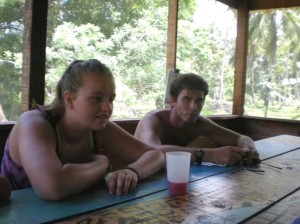 This is not a research station. There may be people with a scientific background at the site but this is the exception rather than the rule. When I was there, there was a Costa Rican biology graduate on site. I can’t emphasis enough how much this contributed to the experience I had there. I was able to learn so much from him about his native flora and fauna and his passion for everything especially reptiles was infectious. As it happened I was doubly lucky as also on site when I was there was a biology graduate who was a six month volunteer like myself and had elected to spend his second phase again at Jalova. His knowledge of birds was unbelievable and being a science graduate he threw himself into recording all the sightings around the base and putting them into a proper database with relevant information. These people have now left the base though and the permanent staff are mostly past volunteers with no scientific background. The base is run by a mathematics graduate. If learning more about the natural history of the area is important to you during your visit I would ask GVI up front specifically about the backgrounds of their on-site staff and bear in mind that staff are coming and going at a rate that is difficult to keep track of. When I left the base a number of the volunteers were better at identifying the local flora and fauna than some of the permanent staff. They do try to hire people with a background in biology/zoology but inevitably these people arrive, realise there is not really any science going on and then leave fairly quickly.
This is not a research station. There may be people with a scientific background at the site but this is the exception rather than the rule. When I was there, there was a Costa Rican biology graduate on site. I can’t emphasis enough how much this contributed to the experience I had there. I was able to learn so much from him about his native flora and fauna and his passion for everything especially reptiles was infectious. As it happened I was doubly lucky as also on site when I was there was a biology graduate who was a six month volunteer like myself and had elected to spend his second phase again at Jalova. His knowledge of birds was unbelievable and being a science graduate he threw himself into recording all the sightings around the base and putting them into a proper database with relevant information. These people have now left the base though and the permanent staff are mostly past volunteers with no scientific background. The base is run by a mathematics graduate. If learning more about the natural history of the area is important to you during your visit I would ask GVI up front specifically about the backgrounds of their on-site staff and bear in mind that staff are coming and going at a rate that is difficult to keep track of. When I left the base a number of the volunteers were better at identifying the local flora and fauna than some of the permanent staff. They do try to hire people with a background in biology/zoology but inevitably these people arrive, realise there is not really any science going on and then leave fairly quickly.
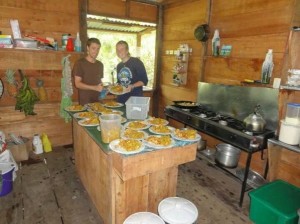 GVI appeared quite prepared to mislead their volunteers when it suited them. During my time on base at Jalova this happened more than once. I think there are two main things that lead them to behave this way, worries about reputation (bad press) and the fear of being sued. Unsurprisingly both are financial motivations. During my time at the base two new staff members who had experience of working with elusive big cats left the base after only 4 weeks because of a disagreement with one of the permanent staff members over the Jaguar camera trapping program. They had experience of live trapping and camera trapping of other endangered felines and felt that they were not being listened too. In effect, as prospective staff members I think they had been miss-sold something too. Rather than be honest about events we volunteers were told by a GVI staff member that they had had to return to Europe because one of their parents had taken seriously ill. I had become friends with these people so I made enquiries and discovered that they were still in the country and very angry with GVI. This is one of a number of events where information given to volunteers by GVI didn’t seem to tally with some of the facts. It doesn’t leave a good impression.
GVI appeared quite prepared to mislead their volunteers when it suited them. During my time on base at Jalova this happened more than once. I think there are two main things that lead them to behave this way, worries about reputation (bad press) and the fear of being sued. Unsurprisingly both are financial motivations. During my time at the base two new staff members who had experience of working with elusive big cats left the base after only 4 weeks because of a disagreement with one of the permanent staff members over the Jaguar camera trapping program. They had experience of live trapping and camera trapping of other endangered felines and felt that they were not being listened too. In effect, as prospective staff members I think they had been miss-sold something too. Rather than be honest about events we volunteers were told by a GVI staff member that they had had to return to Europe because one of their parents had taken seriously ill. I had become friends with these people so I made enquiries and discovered that they were still in the country and very angry with GVI. This is one of a number of events where information given to volunteers by GVI didn’t seem to tally with some of the facts. It doesn’t leave a good impression.
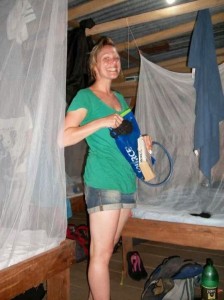 Volunteer treatment at hotel prices. You are a paying guest but the staff will not treat you like one, remember that the daily rate you are paying GVI may be more than your average hotel in Costa Rica. You may well feel that the location and the experience are worth the price and that’s fine but be aware that you are going to be treated like a volunteer. That means that every now and again you’ll spend a whole day on camp duty cleaning toilets, preparing food etc. The staff are exempt from these duties and as a result I refused to clean the staff toilets. There are also lots of rules and restrictions in place which the staff will enforce. Many of these are for your own safety which is perfectly understandable but fear of being sued means that they can be quite strict and after 3 months at the place these rules can get to you. I didn’t mind pitching in with the camp duties because for me it’s part of the experience and I enjoyed communal living aspect of my time there but I have to say that at then end of the day I would rather have signed a waver promising not to sue them than have to follow all the rules. I’m an adult guest in my thirties paying upwards of £40 a day (depending on duration) and for that I expect to be able to walk on the beach with no shoes on if I want to, If I step on something nasty I’ll take the consequences myself. Bizarrely a brief 5 minute demonstration on how to use a two-foot machete seemed to be all that was required before I was entrusted with this potentially lethal tool and sent off on trail maintenance so it’s difficult to follow the logic behind it all sometimes. Also bear in mind that the staff members tend to be quite young (some are recent graduates) and older “volunteers” may have to bite the bullet somewhat when being told what they can or can’t do.
Volunteer treatment at hotel prices. You are a paying guest but the staff will not treat you like one, remember that the daily rate you are paying GVI may be more than your average hotel in Costa Rica. You may well feel that the location and the experience are worth the price and that’s fine but be aware that you are going to be treated like a volunteer. That means that every now and again you’ll spend a whole day on camp duty cleaning toilets, preparing food etc. The staff are exempt from these duties and as a result I refused to clean the staff toilets. There are also lots of rules and restrictions in place which the staff will enforce. Many of these are for your own safety which is perfectly understandable but fear of being sued means that they can be quite strict and after 3 months at the place these rules can get to you. I didn’t mind pitching in with the camp duties because for me it’s part of the experience and I enjoyed communal living aspect of my time there but I have to say that at then end of the day I would rather have signed a waver promising not to sue them than have to follow all the rules. I’m an adult guest in my thirties paying upwards of £40 a day (depending on duration) and for that I expect to be able to walk on the beach with no shoes on if I want to, If I step on something nasty I’ll take the consequences myself. Bizarrely a brief 5 minute demonstration on how to use a two-foot machete seemed to be all that was required before I was entrusted with this potentially lethal tool and sent off on trail maintenance so it’s difficult to follow the logic behind it all sometimes. Also bear in mind that the staff members tend to be quite young (some are recent graduates) and older “volunteers” may have to bite the bullet somewhat when being told what they can or can’t do.
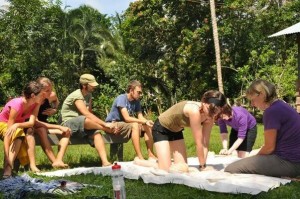 Two weeks gruelling training in the Sweat Box! – I think they might have sorted this out now. I hope so! On arrival at the base the training started and it lasted nearly an entire 2 weeks. That’s 2 weeks of sitting through presentations on how the survey’s work, first aid, taking tests etc. mostly within the confines of an enclosed room with a metal roof. I was there for six months so it didn’t bother me too much but some people had just paid for 2 weeks or 5 weeks and spent 2 whole weeks doing this rather than walking the trails. I would have been furious. After a while hanging out in the sweat box becomes the norm, in fact it’s like the social centre of the camp but it does take some time to acclimatize! And what’s going on with all the silly tests? Okay so it’s important to be able to recognise the bird species so maybe regular testing on this makes sense and there is some important stuff you need to know before you go sticking your hand under a turtle but there was a lot of sitting tests with questions on really quite non-essential stuff. You get the impression that the exams were mostly to try and give credence to the scientific nature of the surveys (it actually had the reverse effect). If it’s not a proper scientific survey and the data isn’t going anywhere useful then I’d rather spend more time out and about thanks, I can learn the non-critical stuff on the job.
Two weeks gruelling training in the Sweat Box! – I think they might have sorted this out now. I hope so! On arrival at the base the training started and it lasted nearly an entire 2 weeks. That’s 2 weeks of sitting through presentations on how the survey’s work, first aid, taking tests etc. mostly within the confines of an enclosed room with a metal roof. I was there for six months so it didn’t bother me too much but some people had just paid for 2 weeks or 5 weeks and spent 2 whole weeks doing this rather than walking the trails. I would have been furious. After a while hanging out in the sweat box becomes the norm, in fact it’s like the social centre of the camp but it does take some time to acclimatize! And what’s going on with all the silly tests? Okay so it’s important to be able to recognise the bird species so maybe regular testing on this makes sense and there is some important stuff you need to know before you go sticking your hand under a turtle but there was a lot of sitting tests with questions on really quite non-essential stuff. You get the impression that the exams were mostly to try and give credence to the scientific nature of the surveys (it actually had the reverse effect). If it’s not a proper scientific survey and the data isn’t going anywhere useful then I’d rather spend more time out and about thanks, I can learn the non-critical stuff on the job.
Conclusion
For those considering the six month internship, I’d say forget it. For the second 10 weeks of the internship GVI effectively just operate as a broker and sign you up to some other volunteer program in the country whilst charging you extra. You’ll save significantly by just going to these places such as the turtle project at Samara directly. They’ll be happy to have you at a fraction of the price. If you ask GVI before you go what the possible projects are for the second three months they’ll be very cagey. This is because they don’t want you to investigate these options independently. The additional support provided by GVI to transport you to the site of your second phase placement effectively amounts to handing over some cash (yes that would be some of the cash you gave them at the beginning when you first paid!) and being told to buy a bus ticket. The same is true of the Spanish language lessons in the middle. If you want to do a 2 week language course sort it out yourself, there are plenty in Granada and it’ll be cheaper than paying GVI a handling fee for doing next to nothing.
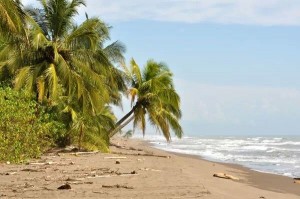 Recommending a visit to the research station at Jalova is trickier, past “volunteers” have mixed opinions and I think if you make a shorter visit you may be less affected by some of the issues I’ve outlined above. The location is fantastic. It’s GVI as an organization that’s the problem. There is no doubt that the turtle program has merit but if you want to volunteer with turtles please do it through a well established not for profit organization such as the STC (or any of the many others) directly. Now I’m back and I understand better how things work in Costa Rica I regret having giving my money to GVI. Apart from the beach cleaning it is difficult to see how the GVI base at Jalova is benefiting the environment of Costa Rica and indeed noise/light pollution, compost heaps and near continuous beach patrols may even be having a negative impact on the immediate environment which is Tortuguero National Park. Three months here left me in no doubt that GVI’s main priority is making money and lets face it a science research facility would not accept “volunteers” on 2 week visits. The sooner GVI own up and accept that they are running an eco-tourist operation and start calling us guests rather than volunteers the better. Making money under the pretence of saving the environment/conducting important scientific research is cheap and deserves to be fully exposed for what it is.
Recommending a visit to the research station at Jalova is trickier, past “volunteers” have mixed opinions and I think if you make a shorter visit you may be less affected by some of the issues I’ve outlined above. The location is fantastic. It’s GVI as an organization that’s the problem. There is no doubt that the turtle program has merit but if you want to volunteer with turtles please do it through a well established not for profit organization such as the STC (or any of the many others) directly. Now I’m back and I understand better how things work in Costa Rica I regret having giving my money to GVI. Apart from the beach cleaning it is difficult to see how the GVI base at Jalova is benefiting the environment of Costa Rica and indeed noise/light pollution, compost heaps and near continuous beach patrols may even be having a negative impact on the immediate environment which is Tortuguero National Park. Three months here left me in no doubt that GVI’s main priority is making money and lets face it a science research facility would not accept “volunteers” on 2 week visits. The sooner GVI own up and accept that they are running an eco-tourist operation and start calling us guests rather than volunteers the better. Making money under the pretence of saving the environment/conducting important scientific research is cheap and deserves to be fully exposed for what it is.
That said an eco-tourist will be hard pushed to find anywhere as diverse, isolated and beautiful as this site in Jalova so it will undoubtedly continue for as long as the Costa Rican authorities permit. I suspect that GVI need to maintain the “research station” rouse in order to stay open. Just make sure you keep your shoes on when visiting the beach!
By Michelle Clanahan Thu Aug 28th 2014 at 12:51 pm
Since you wrote this review things have changed significantly at Jalova. I was there for 3 months in late 2012 and had the BEST experience of my life. It is definitely a research station and scientific papers have been published from the data collected there.
I accept that the staff at any volunteer station such as this make all the difference, having being a volunteer on other GVI projects, and you may have had a “bad bunch”. When I was there all the staff were scientifically trained and were working to increase the scientific content of the work being done. They were very professional, took care of the the guests and taught me so much. The staff took on more menial duties like cleaning loos than any of the volunteers ever did and never expected the volunteers to do any cleaning in the staff house, although the volunteers did need to keep their own loos clean. While our supplies were basic we – as in staff and volunteers – made something of the meals – it becoming a bit of a competition to see how creative we could be and some veritable feasts were served.
I think you evidently had inappropriate expectations of the trip if you were expecting to be treated like a guest – nowhere that I know where i have done volunteer work have I been treated like a “paying guest” and gvi never led me to believe that I would be. The money that you pay covers lots more than the staff salaries, food, and gasoline for the boats as you imply. It also goes for things like building maintenance, licenses and permits …….
I am sorry that you did not have a fantastic experience there, as I and many of my friends did, but I do think you are very mistaken when you say that they are not contributing to conservation in the park …. perhaps that was the case in 2010, but it definitely was not so in 2012.
By Ben Thu Aug 28th 2014 at 1:37 pm
Hi Michelle, thanks for sharing your experience, it’s good to know that things may have changed at Jalova. Can you elaborate a little further on the research papers that have been published or even share links as this was a major point of contention amongst some of the volunteers at base when I was there? We felt that the few posters that had been published were not scientific in any way and we’re not really of much value. GVI are supposed to be sharing the data with MINAE (The Costa Rican agency for the Environment). Are there some examples of what has been shared? Have MINAE made any changes to policy or even small changes to how they manage Tortuguero NP based on knowledge/information provided by GVI? You used the word Guest yourself in your post. I hoped to be a true volunteer rather than a guest but when I saw how unscientific the surveys were and my questions about the value they added went unanswered I realised that I was actually ‘paying guest’ rather than a volunteer hence my use of the term. GVI’s annual financial reports which are available online show that it has a decent turnover. It’s there to make money first and foremost. Don’t get me wrong I’m not advising against a visit to Jalova, I am still very close to the people I met during my time there and we too had some superb cook ups in the Sweat Box, I loved the communal living aspect of the place I just think people need to be aware of the full picture. You say the base is now definitely contributing to conservation in the park. Can you provide examples? When I was there I think the beach cleaning had some value but it could be argued that the nasty compost heap where cooked food was being disposed of and the light pollution and use of chemicals in cleaning products offset this. The STC (not GVI) do some great work with the turtles and there is the argument that patrolling the beach deters poaching but when I was there several of our patrols encountered poachers and for obvious reasons we could not confront them. They just went right on and stole the eggs whilst we watched. I’d be interested to hear how the surveys have changed. In this day and age where nearly everyone seems to want to jump on the environmental band wagon I think it’s really important to properly question these things especially when the parties involved are making a financial profit.